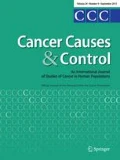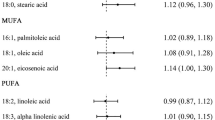International variations and national time trends in disease rates suggest major associations between dietary fat and several important cancers. In contrast, case-control and cohort studies of dietary fat in relation to the same cancers generally report weak associations, or have failed to detect any association with fat intake. This study was undertaken in an attempt to understand the apparent discrepancy between these observations. The results provide an insight into the magnitude of cancer risk reduction that may follow from a practical reduction in dietary fat.
Regression analyses of international variations in cancer incidence rates were used to estimate relative risks (RR) as a function of fat intakes for both males and females. These analyses focused on cancers of the breast, colon, rectum, ovary, and endometrium in females, and colon, rectum, and prostate cancers in males.
Ages 55–69 and 30–44 were considered in order to compare RR estimates between an older and younger age group, and between post- and pre-menopausal women. Corresponding RR estimates were also calculated, based on the regression of changes in disease rates from the mid-1960s to 1980 on changes in dietary fat, using data from several countries. A strong degree of consistency with the RR estimates from international comparisons was observed. The international regression analyses were also used to project changes in cancer rates among Japanese migrants to the United States. A high level of consistency with the observed disease-rate changes was noted. Similarly, the international data analyses were used to project RRs for the fat intake categories used in specific case-control and cohort studies, while acknowledging measurement error in individual dietary assessment. Although certain exceptions are noted, considerable consistency was found between the aggregate and analytic data results, leaving open the strong possibility that a practical reduction in dietary fat could result in a major reduction in the incidence of several prominent cancers in the United States and in other nations having high fat consumption.
Similar content being viewed by others
References
Doll R, Peto R. The causes of cancer. Quantitative estimates of avoidable risks of cancer in the United States today. JNCI 1981; 66: 1191–308.
US Dept of Health and Human Services, The Surgeon General's Report on Nutrition and Health. Pub 88–50210. Washington, DC: US Gov't Printing Office, 1988, 194.
Willett W. Nutritional Epidemiology. New York: Oxford University Press, 1990: Chapter 14.
Kolonel L. Fat and colon cancer: how firm is the epidemiologic evidence? Am J Clin Nutr 1987; 45: 336–41.
United States Department of Agriculture, Nutrient Content of the US Food Supply. Hyattsville, MD: Human Nutrition Information Service Admin Report 299-21, 1988: 8–9.
Federation of American Societies for Experimental Biology. Nutrition Monitoring in the United States: An Updata Report on Nutrition Monitoring. Hyattsville, MD: Life Sciences Research Office, 1989, DHHS Publ 89–1255.
Keys A, Anderson JT, Grande F: Serum cholesterol response to changes in the diet: Parts I–IV. Metabolism 1965; 14: 747–87.
Devesa SS, Silverman DT, Young JL, et al. Cancer incidence and mortality trends among whites in the United States, 1947–84. JNCI 1987; 79: 701–70.
Muir C, Waterhouse J, Mack T, et al. eds. Cancer Incidence in Five Continents, Vol. V, Lyon: WHO, IARC, 1987.
Food and Agriculture Organization of the United Nations. Food Balance Sheets 1975–1977 Average. Rome: FAO, 1980.
Prentice RL, Kakar F, Hursting S, et al. Aspects of the rationale for the Women's Health Trial. JNCI 1988; 80: 802–14.
Doll R, Muir C, Waterhouse J. Cancer Incidence in Five Continents. Vol. II, New York: Springer Verlag, 1970.
Willett WC, Sampson L, Stampfer MJ, et al. Reproducibility and validity of a semi-quantitative food-frequency questionnaire. Am J Epidemiol 1985; 122: 51–65.
Prentice RL, Pepe M, Self SG. Dietary fat and breast cancer: a quantitative assessment of the epidemiologic literature and a discussion of methodologic issues. Cancer Res 1989; 49: 3147–56.
Insull W, Henderson M, Prentice RL, et al. Results of a randomized feasilibility study of a low fat diet. Arch Intern Med 1990; 150: 421–7.
Prentice RL, Sheppard L. Validity of international, time trend and migrant studies of dietary factors and disease risk. Prev Med 1989; 18: 167–79.
Food and Agriculture Organization of the United Nations. Trade Yearbook 1959, Vol. 13, Rome: FAO, 1960: 173–175; and Production Yearbook 1959, Vol. 13, Rome: FAO, 1960: 13–15, 135–7.
Food and Agriculture Organization of the United Nations. Personal Communcation, May 1988.
Tominaga S. Cancer incidence in Japanese in Japan, Hawaii and Western United States. Natl Cancer Inst Monogr 1985; 69: 83–92.
Hirohata T, Nomura AMY, Hankin JH, Kolonel LN, Lee J. An epidemiologic study on the association between diet and breast cancer. JNCI 1987; 78: 595–600.
Kolonel LN, Hinds MW, Hankin JH. Cancer patterns among migrant and native-born Japanese in Hawaii in relation to smoking, drinking and dietary habits. In: Gelboin HV, et al. (eds) Genetic and Environmental Factors in Experimental and Human Cancer. Tokyo: Japan Sci Soc Press, 1980: 327–40.
Howe GR, Hirohata T, Hislop G, et al. Dietary factors and risk of breast cancer: combined analysis of 12 case-control studies. JNCI 1990; 82: 561–9.
Miller AB, Kelly A, Choi NW. A study of diet and breast cancer. Am J Epidemiol 1978; 107: 499–509.
Willett WC, Stampfer MJ, Colditz GA, et al. Dietary fat and the risk of breast cancer. N Engl J Med 1987; 316: 22–8.
Jones DY, Schatzkin A, Green SB, et al. Dietary fat and breast cancer in the National Health and Nutrition Survey I. Epidemiologic Follow-up Study. JNCI 1987; 79: 465–71.
Graham S, Marshall J, Haughey B, et al. Dietary epidemiology of cancer of the colon in Western New York. Am J Epidemiol 1988; 128: 490–503.
Jain M, Cook GM, David FG, et al. A case-control study of diet and colo-rectal cancer. Int J Cancer 1980; 26: 757–68.
Kune S, Kune GA, Watson LF. Case-control study of dietary etiological factors: the Melbourne colorectal cancer study. Nutr Cancer 1987; 9: 21–42.
Lyon JL, Mahoney AW, West DW. Energy intake: its relationship to colon cancer risk. JNCI 1987; 78: 853–61.
Potter JD, McMichael AJ. Diet and cancer of the colon and rectum: a case-control study. JNCI 1986; 76: 557–69.
Slattery ML, Schumacher MC, Smith KR, et al. Physical activity, diet and risk of colon cancer in Utah. Am J Epidemiol 1988; 128: 989–99.
Lee HP, Gourley L, Duffy SW, et al. Colorectal cancer and diet in an Asian population—a case-control study among Singapore Chinese. Int J Cancer 1989; 43: 1007–16.
Tuyns AJ, Hoelterman M, Kaaks R. Colorectal cancer and the intake of nutrients: oligosaccharides are a risk factor, fats are not. A case-control study in Belgium. Nutr Cancer 1987; 10: 181–96.
Stemmerman GN, Nomura AMY, Heilbrun LK. Dietary fat and the risk of colorectal cancer. Cancer Res 1984; 44: 4633–7.
Byers T, Marshall J, Graham S, Mettlin C, Swanson M. A case-control study of dietary and nondietary factors in ovarian cancer. JNCI 1983; 71: 681–6.
Cramer DW, Welch WR, Hutchison GB, Willett W, Scully RE. Dietary animal fat in relation to ovarian cancer risk. Obstet Gynecol 1984; 63: 833–8.
Shu XO, Gao YT, Yuan JM, Ziegler RG, Brinton LA. Dietary factors and epithelial ovarian cancer. Br J Cancer 1989; 59: 92–6.
Slattery ML, Schuman KL, West DW, et al. Nutrient intake and ovarian cancer. Am J Epidemiol 1989; 130: 497–502.
La Vecchia C, DeCarli A, Negri E, et al. Dietary factors and the risk of epithelial ovarian cancer. JNCI 1987; 79: 633–99.
La Vecchia C, DeCarli A, Fasoli M, Gentile A. Nutrition and diet in the etiology of endometrial cancer. Cancer 1986; 57: 1248–53.
Graham S, Haughey B, Marshall J, et al. Diet in the epidemiology of carcinoma of the prostate gland. JNCI 1983; 70: 687–92.
Kolonel LN, Yoshizawa CN, Hankin JH. Diet and prostatic cancer: a case-control study in Hawaii. Am J Epidemiol 1988; 127: 999–1012.
Mettlin C, Selenskas S, Natarajan N, Huben R. Beta-carotene and animal fats in their relationship to prostate cancer risk. Cancer 1989; 64: 605–12.
Ohno Y, Yoshida O, Oishi K, et al. Dietary β-carotene and cancer of the prostate. A case-control study in Kyoto, Japan. Cancer Res 1988; 48: 1331–6.
Ross RK, Shimizu H, Paganini-Hill A, Honda G, Henderson BE. Case-control study of prostate cancer in blacks and whites in Southern California. JNCI 1987; 78: 869–74.
Mills PK, Beeson L, Phillips RL, Fraser GE. Cohort study of diet, lifestyle and prostate cancer in Adventist man. Cancer 1989; 64: 598–604.
Severson RK, Nomura AMY, Grave JS, Stemmerman GN. A prospective study of demographics, diet and prostate cancer among men of Japanese ancestry in Hawaii. Cancer Res 1989; 49: 1857–60.
Prentice RL, Thompson DJ, Clifford C, et al. Dietary fat reduction and plasma estradiol concentration in healthy post-menopausal women. JNCI 1990; 82: 129–34.
Additional information
This work was supported by grants GM-24472 and CA-38526 from the US National Institutes of Health.
The authors are in the Division of Public Health Sciences, Fred Hutchinson Cancer Research Center, 1124 Columbia Street, Seattle WA 98104, USA, to which reprint requests should be addressed.
Rights and permissions
About this article
Cite this article
Prentice, R.L., Sheppard, L. Dietary fat and cancer: consistency of the epidemiologic data, and disease prevention that may follow from a practical reduction in fat consumption. Cancer Causes Control 1, 81–97 (1990). https://doi.org/10.1007/BF00053187
Received:
Revised:
Accepted:
Issue Date:
DOI: https://doi.org/10.1007/BF00053187



